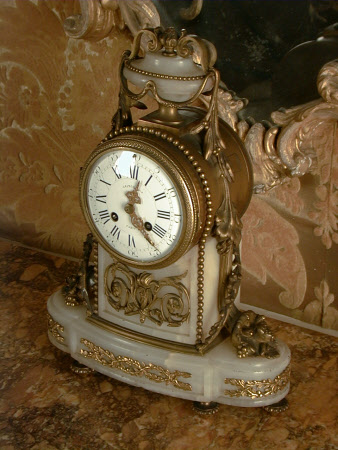Mantel clock
Raingo Freres
Category
Horology
Date
1815 - 1898
Materials
Alabaster, ormolu, brass and enamel
Measurements
356 mm (Height)
Place of origin
Paris
Order this imageCollection
Dyrham, Gloucestershire
NT 453244
Summary
An alabaster mantel clock with enamel dial marked Raingo Freres, Paris. The surmounting urn, case and base mounted with tooled ormolu flowers and scrolls. An 8 day striking movement on a bell, count wheel strike. Mechanism is stamped Raingo and 752 The clockmaker and bronzier Raingo Frères was founded in 1813 by Zacharie Joseph Raingo. He was born in 1775 in Belgium, lived in Tournai, was active in Ghent and moved to Paris in 1813. In Tournai, he probably made one of his first astronomical clocks with planetarium which was his specialty. Raingo was named the "Watchmaker-Mécanicien" by the Duke of Orleans and "Watchmaker-Mécanicien du Garde-Meuble de la Couronne" (Supplier of the King of France) in 1824. King George IV of England bought a planetarium-clock of Raingo in 1824. In 1834, the company received an honorable mention in an exhibition in Paris. The company sold clocks, travel clocks, and wall clocks. While the four Raingo brothers were first recognized as clockmakers, in 1841 they added bronzes and furnishings to their repertoire. Known for the quality of their ormolu (gold plating), by 1860, Raingo Frères had furnished bronzes, garniture (decorations) and table pieces for the apartments of Emperor Napoleon III and his wife, the Empress Eugenia, examples of which are now in the collection of The Louvre. They made reproductions of antiques, and later produced small models of works by contemporary artists, such as Pradier, Carrier-Belleuse, and Auguste Moreau. They also collaborated with famous ebeniste François Linké. In 1862, the company was present at the International Exhibition in London. In the world exhibitions in 1867, 1878 and 1889, the company also won several medals, even a gold medal in 1898. Some of their works are in different museums like Musée des Arts et Métiers in Paris, Museo Poldi Pezzoli in Milan and in Palacio Real de Madrid.
Provenance
Indigenous collection purchased by Ministry of Works in 1956 and given to Dyrham Park in 1661
Makers and roles
Raingo Freres , horologist
